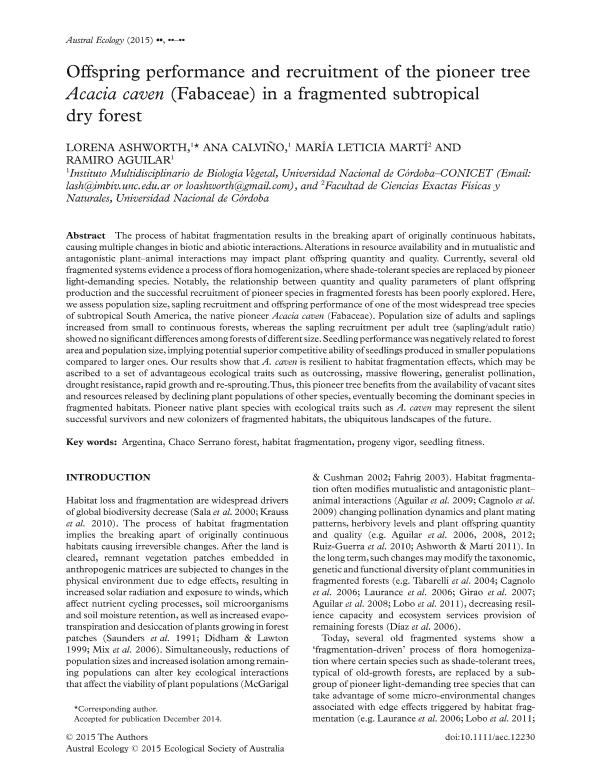Mostrar el registro sencillo del ítem
dc.contributor.author
Ashworth, Lorena

dc.contributor.author
Calviño, Ana Alejandra

dc.contributor.author
Marti, María Leticia
dc.contributor.author
Aguilar, Ramiro

dc.date.available
2017-04-17T15:37:47Z
dc.date.issued
2015-02
dc.identifier.citation
Ashworth, Lorena; Calviño, Ana Alejandra; Marti, María Leticia; Aguilar, Ramiro; Offspring performance and recruitment of the pionner tree Acacia caven (Fabaceae) in a fragmented subtropical dry forest; Wiley Blackwell Publishing, Inc; Austral Ecology; 40; 6; 2-2015; 634-641
dc.identifier.issn
1442-9985
dc.identifier.uri
http://hdl.handle.net/11336/15292
dc.description.abstract
The process of habitat fragmentation results in the breaking apart of originally continuous habitats,causing multiple changes in biotic and abiotic interactions. Alterations in resource availability and in mutualistic and antagonistic plant?animal interactions may impact plant offspring quantity and quality. Currently, several old fragmented systems evidence a process of flora homogenization, where shade-tolerant species are replaced by pioneer light-demanding species. Notably, the elationship between quantity and quality parameters of plant offspring production and the successful recruitment of pioneer species in fragmented forests has been poorly explored. Here, we assess population size, sapling ecruitment and offspring performance of one of the most widespread tree species of subtropical South America, the native pioneer Acacia caven (Fabaceae). Population size of adults and saplings increased from small to continuous forests, whereas the sapling recruitment per adult tree (sapling/adult ratio) showed no significant differences among forests of different size. Seedling performance was negatively related to forest area and population size, implying potential superior competitive ability of seedlings produced in smaller populations compared to larger ones. Our results show that A. caven is resilient to habitat fragmentation effects, which may be ascribed to a set of advantageous ecological traits such as outcrossing, massive flowering, generalist pollination, drought resistance, rapid growth and re-sprouting.Thus, this pioneer tree benefits from the vailability of vacant sites and resources released by declining plant populations of other species, eventually becoming the dominant species in fragmented habitats. Pioneer native plant species with ecological traits such as A. caven may represent the silent successful survivors and new colonizers of fragmented habitats, the ubiquitous landscapes of the future.
dc.format
application/pdf
dc.language.iso
eng
dc.publisher
Wiley Blackwell Publishing, Inc

dc.rights
info:eu-repo/semantics/openAccess
dc.rights.uri
https://creativecommons.org/licenses/by-nc-sa/2.5/ar/
dc.subject
Chaco Serrano Forest Chaco Serrano Forest
dc.subject
Habitat Fragmentation
dc.subject
Progeny Vigor
dc.subject
Seedlind Fitness
dc.subject.classification
Ecología

dc.subject.classification
Ciencias Biológicas

dc.subject.classification
CIENCIAS NATURALES Y EXACTAS

dc.title
Offspring performance and recruitment of the pionner tree Acacia caven (Fabaceae) in a fragmented subtropical dry forest
dc.type
info:eu-repo/semantics/article
dc.type
info:ar-repo/semantics/artículo
dc.type
info:eu-repo/semantics/publishedVersion
dc.date.updated
2017-04-11T17:55:06Z
dc.identifier.eissn
1442-9993
dc.journal.volume
40
dc.journal.number
6
dc.journal.pagination
634-641
dc.journal.pais
Reino Unido

dc.journal.ciudad
Londres
dc.description.fil
Fil: Ashworth, Lorena. Consejo Nacional de Investigaciones Científicas y Técnicas. Centro Científico Tecnológico Córdoba. Instituto Multidisciplinario de Biología Vegetal (p); Argentina. Universidad Nacional de Córdoba; Argentina
dc.description.fil
Fil: Calviño, Ana Alejandra. Consejo Nacional de Investigaciones Científicas y Técnicas. Centro Científico Tecnológico Córdoba. Instituto Multidisciplinario de Biología Vegetal (p); Argentina. Universidad Nacional de Córdoba; Argentina
dc.description.fil
Fil: Marti, María Leticia. Universidad Nacional de Córdoba. Facultad de Ciencias Exactas, Físicas y Naturales; Argentina
dc.description.fil
Fil: Aguilar, Ramiro. Consejo Nacional de Investigaciones Científicas y Técnicas. Centro Científico Tecnológico Córdoba. Instituto Multidisciplinario de Biología Vegetal (p); Argentina. Universidad Nacional de Córdoba; Argentina
dc.journal.title
Austral Ecology

dc.relation.alternativeid
info:eu-repo/semantics/altIdentifier/url/http://onlinelibrary.wiley.com/doi/10.1111/aec.12230/abstract
dc.relation.alternativeid
info:eu-repo/semantics/altIdentifier/doi/http://dx.doi.org/10.1111/aec.12230
Archivos asociados
